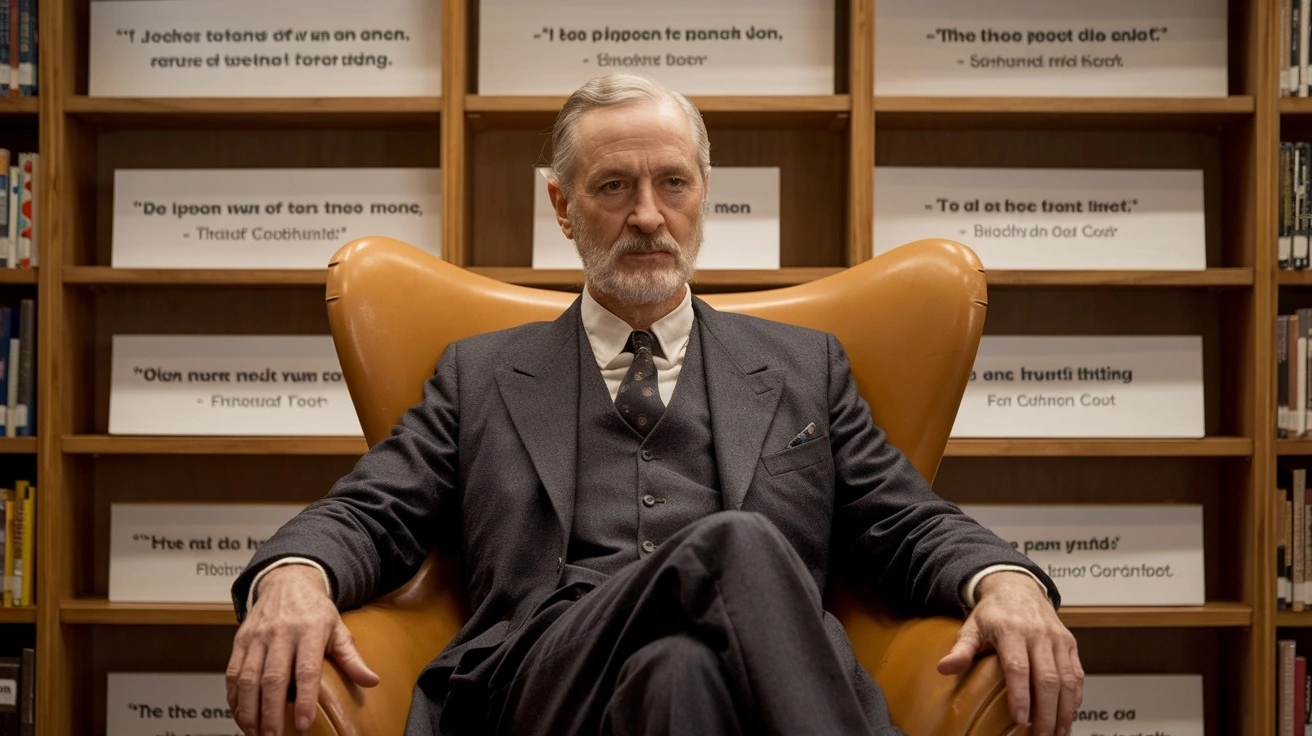In this collection, we delve into some of the most thought-provoking Sigmund Freud Quotes that offer a unique perspective on the motivations that drive human actions.
Sigmund Freud, the father of psychoanalysis, revolutionized the way we understand the human mind.
These Sigmund Freud Quotes highlight his innovative thinking and his contributions to psychology, offering valuable lessons on the human condition.
On the Unconscious Mind
“The unconscious is the true psychic reality; in its inner nature it is just as much unknown to us as the reality of the external world.”
Author: Sigmund Freud
Description:
Freud emphasizes the power and mystery of the unconscious mind, suggesting that it plays a crucial role in shaping our thoughts, feelings, and behaviors, much like the external world shapes our experiences.
“Dreams are the royal road to the unconscious.”
Author: Sigmund Freud
Description:
Freud believed that dreams reveal the hidden desires and thoughts of the unconscious mind. This quote underscores the significance he placed on dream analysis in understanding the psyche.
“Where id was, their ego shall be.”
Author: Sigmund Freud
Description:
Freud’s quote reflects his belief in the transformation of unconscious drives (the id) into conscious awareness (the ego). He saw this as a fundamental process of psychological development.
“We are never so defenseless against suffering as when we love.”
Author: Sigmund Freud
Description:
Freud highlights the vulnerability that love brings, as it exposes us to deep emotional risks and the potential for pain. This quote reveals his understanding of the complexities of human relationships.
“The mind is like an iceberg; it floats with one-seventh of its bulk above water.”
Author: Sigmund Freud
Description:
This metaphor illustrates Freud’s view that the conscious mind is only a small part of our overall mental life, with the vast majority lying hidden beneath the surface in the unconscious.
“Neurosis is the inability to tolerate ambiguity.”
Author: Sigmund Freud
Description:
Freud suggests that neurosis arises from a person’s struggle to manage the complexities and uncertainties of life, reflecting his focus on the tension between conflicting desires and realities.
“A man who has been the indisputable favorite of his mother keeps for life the feeling of a conqueror.”
Author: Sigmund Freud
Description:
Freud points to the significant impact early childhood relationships, particularly with one’s mother, have on an individual’s self-perception and future success.
“The first human who hurled an insult instead of a stone was the founder of civilization.”
Author: Sigmund Freud
Description:
Freud humorously suggests that the use of language, rather than violence, marked a significant step in human development and the rise of civilization.
“Anatomy is destiny.”
Author: Sigmund Freud
Description:
This quote reflects Freud’s belief in the profound influence of biological factors, particularly gender, on an individual’s psychological development and life trajectory.
“The interpretation of dreams is the royal road to a knowledge of the unconscious activities of the mind.”
Author: Sigmund Freud
Description:
Freud reiterates the importance of dreams in unlocking the secrets of the unconscious mind, reinforcing his view of dream analysis as a critical tool in psychoanalysis.
On Human Behavior
“Most people do not want freedom, because freedom involves responsibility, and most people are frightened of responsibility.”
Author: Sigmund Freud
Description:
Freud offers a critique of human nature, suggesting that many prefer the comfort of dependency over the challenges that come with true freedom and responsibility.
“In the small matters, trust the mind; in the large ones, the heart.”
Author: Sigmund Freud
Description:
Freud advises balancing rational thought with emotional intuition, highlighting the need for both intellect and emotion in making decisions.
“The ego is not master in its own house.”
Author: Sigmund Freud
Description:
Freud emphasizes the limits of conscious control over our actions, as the unconscious mind often drives behavior in ways we are unaware of.
“Psychoanalysis aims to relieve people of their neurotic unhappiness so that they can be normally unhappy.”
Author: Sigmund Freud
Description:
Freud acknowledges that psychoanalysis is not about achieving perfect happiness but rather about helping individuals cope better with the inevitable challenges of life.
“Being entirely honest with oneself is a good exercise.”
Author: Sigmund Freud
Description:
Freud stresses the importance of self-awareness and honesty in personal growth, suggesting that confronting one’s true feelings and thoughts is crucial for mental health.
“We are what we are because we have been what we have been.”
Author: Sigmund Freud
Description:
This quote reflects Freud’s belief in the lasting impact of past experiences on our current identity and behavior, emphasizing the importance of understanding one’s history.
“A civilization which leaves so large a number of its participants unsatisfied and drives them into revolt neither has nor deserves the prospect of a lasting existence.”
Author: Sigmund Freud
Description:
Freud critiques societies that fail to meet the psychological needs of their members, suggesting that such civilizations are inherently unstable.
“One day, in retrospect, the years of struggle will strike you as the most beautiful.”
Author: Sigmund Freud
Description:
Freud offers a hopeful perspective, suggesting that the difficulties we face in life can later be seen as valuable and meaningful experiences.
“Illusions commend themselves to us because they save us pain and allow us to enjoy pleasure instead.”
Author: Sigmund Freud
Description:
Freud explains why people cling to comforting illusions, as they provide an escape from the harsh realities of life and offer temporary satisfaction.
“The more perfect a person is on the outside, the more demons they have on the inside.”
Author: Sigmund Freud
Description:
Freud suggests that outward perfection often masks deep internal struggles, reflecting his focus on the hidden conflicts within the human psyche.
On Sexuality and Desire
“The great question that has never been answered and which I have not yet been able to answer, despite my thirty years of research into the feminine soul, is ‘What does a woman want?'”
Author: Sigmund Freud
Description:
Freud humorously admits to the complexities and mysteries of understanding women’s desires, highlighting his lifelong interest in the psychology of sexuality.
“Love and work are the cornerstones of our humanness.”
Author: Sigmund Freud
Description:
Freud emphasizes the fundamental role that love and productive work play in a person’s life, suggesting that these two elements are essential to human fulfillment.
“A certain degree of neurosis is of inestimable value as a drive, especially to a psychologist.”
Author: Sigmund Freud
Description:
Freud acknowledges the motivating power of neurosis, particularly for those studying the mind, suggesting that a touch of inner conflict can fuel intellectual pursuit.
“The sexual life of adult women is a ‘dark continent’ for psychology.”
Author: Sigmund Freud
Description:
Freud metaphorically describes the complexity and challenges of understanding female sexuality, a subject that he found particularly enigmatic in his research.
“The price of civilization is paid in forfeiting instincts.”
Author: Sigmund Freud
Description:
Freud argues that the development of civilized society requires individuals to suppress their instincts, particularly those related to sexuality and aggression.
“The mind is like an iceberg; it floats with one-seventh of its bulk above water.”
Author: Sigmund Freud
Description:
Freud uses this metaphor to describe the conscious and unconscious mind, where the larger, hidden part (the unconscious) holds repressed desires and thoughts.
“The libido is a general term for the mental energy used in erotic attachments.”
Author: Sigmund Freud
Description:
Freud introduces the concept of libido as the driving force behind sexual desire and attachment, central to his theories of psychosexual development.
“Civilization began the first time an angry person cast a word instead of a rock.”
Author: Sigmund Freud
Description:
Freud highlights the role of controlled expression of anger, particularly through language, as a key factor in the development of civilized society.
“We are never so defenseless against suffering as when we love.”
Author: Sigmund Freud
Description:
Freud acknowledges the vulnerability that comes with love, as it opens individuals up to deep emotional risks and the potential for pain.
“No mortal can keep a secret. If his lips are silent, he chatters with his fingertips; betrayal oozes out of him at every pore.”
Author: Sigmund Freud
Description:
Freud suggests that the unconscious mind always finds a way to express itself, even if we try to keep certain thoughts or feelings hidden.
On Dreams and the Subconscious
“Dreams are the royal road to the unconscious.”
Author: Sigmund Freud
Description:
Freud believed that dreams reveal the hidden desires and thoughts of the unconscious mind. This quote underscores the significance he placed on dream analysis in understanding the psyche.
“The interpretation of dreams is the royal road to a knowledge of the unconscious activities of the mind.”
Author: Sigmund Freud
Description:
Freud reiterates the importance of dreams in unlocking the secrets of the unconscious mind, reinforcing his view of dream analysis as a critical tool in psychoanalysis.
“Sometimes a cigar is just a cigar.”
Author: Sigmund Freud
Description:
This famous quote is often cited to illustrate that not all symbols in dreams or thoughts have deeper meanings, though Freud’s overall work suggested that most do.
“The mind is like an iceberg; it floats with one-seventh of its bulk above water.”
Author: Sigmund Freud
Description:
Freud uses this metaphor to describe the conscious and unconscious mind, where the larger, hidden part (the unconscious) holds repressed desires and thoughts.
“Dreams are the guardians of sleep and not its disturbers.”
Author: Sigmund Freud
Description:
Freud believed that dreams serve to protect sleep by fulfilling unconscious desires that might otherwise wake the dreamer, maintaining mental balance.
“A dream is a disguised fulfillment of a suppressed wish.”
Author: Sigmund Freud
Description:
Freud’s quote summarizes his theory that dreams represent repressed desires and unresolved conflicts from the unconscious mind.
“Every dream will reveal itself as a psychological structure, full of significance.”
Author: Sigmund Freud
Description:
Freud emphasizes the importance of analyzing dreams to uncover their deeper psychological meanings, reflecting his belief in their complexity and significance.
“The dream is the (disguised) fulfillment of a (suppressed, repressed) wish.”
Author: Sigmund Freud
Description:
Freud highlights the idea that dreams serve to fulfill repressed desires, often in symbolic or disguised forms, to protect the dreamer’s consciousness.
“The interpretation of dreams is the royal road to a knowledge of the unconscious activities of the mind.”
Author: Sigmund Freud
Description:
Freud reiterates the importance of dreams in unlocking the secrets of the unconscious mind, reinforcing his view of dream analysis as a critical tool in psychoanalysis.
“The unconscious is the true psychic reality; in its inner nature, it is just as much unknown to us as the reality of the external world.”
Author: Sigmund Freud
Description:
Freud emphasizes the power and mystery of the unconscious mind, suggesting that it plays a crucial role in shaping our thoughts, feelings, and behaviors, much like the external world shapes our experiences.
On Society and Civilization
“The price of civilization is paid in forfeiting instincts.”
Author: Sigmund Freud
Description:
Freud argues that the development of civilized society requires individuals to suppress their instincts, particularly those related to sexuality and aggression.
“A civilization which leaves so large a number of its participants unsatisfied and drives them into revolt neither has nor deserves the prospect of a lasting existence.”
Author: Sigmund Freud
Description:
Freud critiques societies that fail to meet the psychological needs of their members, suggesting that such civilizations are inherently unstable.
“The first human who hurled an insult instead of a stone was the founder of civilization.”
Author: Sigmund Freud
Description:
Freud humorously suggests that the use of language, rather than violence, marked a significant step in human development and the rise of civilization.
“Civilization began the first time an angry person cast a word instead of a rock.”
Author: Sigmund Freud
Description:
Freud highlights the role of controlled expression of anger, particularly through language, as a key factor in the development of civilized society.
“Illusions commend themselves to us because they save us pain and allow us to enjoy pleasure instead.”
Author: Sigmund Freud
Description:
Freud explains why people cling to comforting illusions, as they provide an escape from the harsh realities of life and offer temporary satisfaction.
“Where id was, their ego shall be.”
Author: Sigmund Freud
Description:
Freud’s quote reflects his belief in the transformation of unconscious drives (the id) into conscious awareness (the ego). He saw this as a fundamental process of psychological development.
“The more perfect a person is on the outside, the more demons they have on the inside.”
Author: Sigmund Freud
Description:
Freud suggests that outward perfection often masks deep internal struggles, reflecting his focus on the hidden conflicts within the human psyche.
“The mind is like an iceberg; it floats with one-seventh of its bulk above water.”
Author: Sigmund Freud
Description:
This metaphor illustrates Freud’s view that the conscious mind is only a small part of our overall mental life, with the vast majority lying hidden beneath the surface in the unconscious.
“We are never so defenseless against suffering as when we love.”
Author: Sigmund Freud
Description:
Freud highlights the vulnerability that love brings, as it exposes us to deep emotional risks and the potential for pain. This quote reveals his understanding of the complexities of human relationships.
“In the small matters, trust the mind; in the large ones, the heart.”
Author: Sigmund Freud
Description:
Freud advises balancing rational thought with emotional intuition, highlighting the need for both intellect and emotion in making decisions.
On Love and Relationships
“We are never so defenseless against suffering as when we love.”
Author: Sigmund Freud
Description:
Freud acknowledges the vulnerability that comes with love, as it opens individuals up to deep emotional risks and the potential for pain.
“Love and work are the cornerstones of our humanness.”
Author: Sigmund Freud
Description:
Freud emphasizes the fundamental role that love and productive work play in a person’s life, suggesting that these two elements are essential to human fulfillment.
“The great question that has never been answered and which I have not yet been able to answer, despite my thirty years of research into the feminine soul, is ‘What does a woman want?'”
Author: Sigmund Freud
Description:
Freud humorously admits to the complexities and mysteries of understanding women’s desires, highlighting his lifelong interest in the psychology of sexuality.
“The more perfect a person is on the outside, the more demons they have on the inside.”
Author: Sigmund Freud
Description:
Freud suggests that outward perfection often masks deep internal struggles, reflecting his focus on the hidden conflicts within the human psyche.
“Being entirely honest with oneself is a good exercise.”
Author: Sigmund Freud
Description:
Freud stresses the importance of self-awareness and honesty in personal growth, suggesting that confronting one’s true feelings and thoughts is crucial for mental health.
“A man who has been the indisputable favorite of his mother keeps for life the feeling of a conqueror.”
Author: Sigmund Freud
Description:
Freud points to the significant impact early childhood relationships, particularly with one’s mother, have on an individual’s self-perception and future success.
“The first human who hurled an insult instead of a stone was the founder of civilization.”
Author: Sigmund Freud
Description:
Freud humorously suggests that the use of language, rather than violence, marked a significant step in human development and the rise of civilization.
“Civilization began the first time an angry person cast a word instead of a rock.”
Author: Sigmund Freud
Description:
Freud highlights the role of controlled expression of anger, particularly through language, as a key factor in the development of civilized society.
“A certain degree of neurosis is of inestimable value as a drive, especially to a psychologist.”
Author: Sigmund Freud
Description:
Freud acknowledges the motivating power of neurosis, particularly for those studying the mind, suggesting that a touch of inner conflict can fuel intellectual pursuit.
“The sexual life of adult women is a ‘dark continent’ for psychology.”
Author: Sigmund Freud
Description:
Freud metaphorically describes the complexity and challenges of understanding female sexuality, a subject that he found particularly enigmatic in his research.
On Self-Understanding
“Being entirely honest with oneself is a good exercise.”
Author: Sigmund Freud
Description:
Freud stresses the importance of self-awareness and honesty in personal growth, suggesting that confronting one’s true feelings and thoughts is crucial for mental health.
“We are what we are because we have been what we have been.”
Author: Sigmund Freud
Description:
This quote reflects Freud’s belief in the lasting impact of past experiences on our current identity and behavior, emphasizing the importance of understanding one’s history.
“The more perfect a person is on the outside, the more demons they have on the inside.”
Author: Sigmund Freud
Description:
Freud suggests that outward perfection often masks deep internal struggles, reflecting his focus on the hidden conflicts within the human psyche.
“Most people do not want freedom, because freedom involves responsibility, and most people are frightened of responsibility.”
Author: Sigmund Freud
Description:
Freud offers a critique of human nature, suggesting that many prefer the comfort of dependency over the challenges that come with true freedom and responsibility.
“Psychoanalysis aims to relieve people of their neurotic unhappiness so that they can be normally unhappy.”
Author: Sigmund Freud
Description:
Freud acknowledges that psychoanalysis is not about achieving perfect happiness but rather about helping individuals cope better with the inevitable challenges of life.
“Illusions commend themselves to us because they save us pain and allow us to enjoy pleasure instead.”
Author: Sigmund Freud
Description:
Freud explains why people cling to comforting illusions, as they provide an escape from the harsh realities of life and offer temporary satisfaction.
“A certain degree of neurosis is of inestimable value as a drive, especially to a psychologist.”
Author: Sigmund Freud
Description:
Freud acknowledges the motivating power of neurosis, particularly for those studying the mind, suggesting that a touch of inner conflict can fuel intellectual pursuit.
“One day, in retrospect, the years of struggle will strike you as the most beautiful.”
Author: Sigmund Freud
Description:
Freud offers a hopeful perspective, suggesting that the difficulties we face in life can later be seen as valuable and meaningful experiences.
“We are never so defenseless against suffering as when we love.”
Author: Sigmund Freud
Description:
Freud acknowledges the vulnerability that comes with love, as it opens individuals up to deep emotional risks and the potential for pain.
“The first human who hurled an insult instead of a stone was the founder of civilization.”
Author: Sigmund Freud
Description:
Freud humorously suggests that the use of language, rather than violence, marked a significant step in human development and the rise of civilization.
On Religion and Spirituality
“Religion is an illusion and it derives its strength from the fact that it falls in with our instinctual desires.”
Author: Sigmund Freud
Description:
Freud viewed religion as a human construct that fulfills deep-seated psychological needs, particularly the desire for protection and comfort in a chaotic world.
“The more the fruits of knowledge become accessible to men, the more widespread is the decline of religious belief.”
Author: Sigmund Freud
Description:
Freud argues that the advancement of knowledge and scientific understanding often leads to a decline in religious belief, as people begin to question traditional explanations of the world.
“Religion is comparable to a childhood neurosis.”
Author: Sigmund Freud
Description:
Freud controversially compared religion to a psychological condition that, while comforting and necessary in childhood, maybe outgrown as individuals mature and confront reality.
“The idea of God was not necessary to make the universe.”
Author: Sigmund Freud
Description:
Freud challenges the necessity of a divine creator, reflecting his belief in the power of science and reason to explain the universe without relying on religious explanations.
“Religious doctrines are all illusions, they do not admit of proof, and no one can be compelled to consider them as true or to believe in them.”
Author: Sigmund Freud
Description:
Freud asserts that religious beliefs lack empirical evidence, framing them as illusions that, while comforting to some, cannot be universally accepted as truth.
“Religion is an attempt to get control over the sensory world, in which we are placed, using the wish world, which we have developed inside us as a result of biological and psychological necessities.”
Author: Sigmund Freud
Description:
Freud describes religion as a psychological response to the challenges of life, where humans project their inner wishes and fears onto a supernatural framework to make sense of the world.
“The goal of all life is death.”
Author: Sigmund Freud
Description:
Freud’s concept of the “death drive” suggests that all living beings have an inherent drive towards self-destruction, which he saw as a counterpart to the instinct for life and survival.
“Man’s needs for religion are rooted in the frailties of the human condition.”
Author: Sigmund Freud
Description:
Freud believed that religious beliefs stem from human vulnerabilities and the need for comfort in the face of life’s uncertainties, reflecting his view that religion is a psychological crutch.
“Religion is an illusion and it falls in with our instinctual desires.”
Author: Sigmund Freud
Description:
Freud argued that religion satisfies primal psychological needs by offering comforting illusions that align with our deepest desires, particularly the need for protection and order.
“When a man is freed from religion, he has a better chance to live a normal and wholesome life.”
Author: Sigmund Freud
Description:
Freud believed that liberation from religious dogma allows individuals to confront reality more honestly, leading to a more authentic and fulfilling existence.
On Neurosis and Mental Health
“Psychoanalysis aims to relieve people of their neurotic unhappiness so that they can be normally unhappy.”
Author: Sigmund Freud
Description:
Freud acknowledges that psychoanalysis is not about achieving perfect happiness but rather about helping individuals cope better with the inevitable challenges of life.
“A certain degree of neurosis is of inestimable value as a drive, especially to a psychologist.”
Author: Sigmund Freud
Description:
Freud acknowledges the motivating power of neurosis, particularly for those studying the mind, suggesting that a touch of inner conflict can fuel intellectual pursuit.
“We are never so defenseless against suffering as when we love.”
Author: Sigmund Freud
Description:
Freud highlights the vulnerability that love brings, as it exposes us to deep emotional risks and the potential for pain.
“The great question that has never been answered and which I have not yet been able to answer, despite my thirty years of research into the feminine soul, is ‘What does a woman want?'”
Author: Sigmund Freud
Description:
Freud humorously admits to the complexities and mysteries of understanding women’s desires, highlighting his lifelong interest in the psychology of sexuality.
“The mind is not a vessel to be filled but a fire to be kindled.”
Author: Sigmund Freud
Description:
Freud encourages an active engagement with one’s thoughts and emotions, likening the mind to a fire that must be ignited rather than passively filled.
“Where id was, their ego shall be.”
Author: Sigmund Freud
Description:
Freud describes the process of bringing unconscious desires (the id) under the control of conscious reasoning (the ego), which he viewed as essential for healthy psychological development.
“In the small matters, trust the mind; in the large ones, the heart.”
Author: Sigmund Freud
Description:
Freud advises balancing rational thought with emotional intuition, highlighting the need for both intellect and emotion in making decisions.
“One day, in retrospect, the years of struggle will strike you as the most beautiful.”
Author: Sigmund Freud
Description:
Freud offers a hopeful perspective, suggesting that the difficulties we face in life can later be seen as valuable and meaningful experiences.
“Illusions commend themselves to us because they save us pain and allow us to enjoy pleasure instead.”
Author: Sigmund Freud
Description:
Freud explains why people cling to comforting illusions, as they provide an escape from the harsh realities of life and offer temporary satisfaction.
“Being entirely honest with oneself is a good exercise.”
Author: Sigmund Freud
Description:
Freud stresses the importance of self-awareness and honesty in personal growth, suggesting that confronting one’s true feelings and thoughts is crucial for mental health.
On the Nature of Happiness and Fulfillment
“One day, in retrospect, the years of struggle will strike you as the most beautiful.”
Author: Sigmund Freud
Description:
Freud offers a reflective view of life’s challenges, suggesting that the struggles we endure often become the most cherished and meaningful experiences in our lives.
“The more perfect a person is on the outside, the more demons they have on the inside.”
Author: Sigmund Freud
Description:
Freud highlights the idea that outward appearances can be deceiving, and those who seem flawless externally may be grappling with deep internal conflicts.
“Most people do not want freedom, because freedom involves responsibility, and most people are frightened of responsibility.”
Author: Sigmund Freud
Description:
Freud suggests that many individuals shy away from true freedom because it comes with the burden of responsibility, which they find daunting.
“We are never so defenseless against suffering as when we love.”
Author: Sigmund Freud
Description:
Freud points out the vulnerability that comes with love, as it opens us up to the possibility of deep emotional pain, but also to profound joy.
“Being entirely honest with oneself is a good exercise.”
Author: Sigmund Freud
Description:
Freud emphasizes the importance of self-honesty as a crucial practice for personal growth and mental well-being, encouraging individuals to confront their true feelings and thoughts.
“In the small matters, trust the mind; in the large ones, the heart.”
Author: Sigmund Freud
Description:
Freud advises balancing rational thought with emotional intuition, suggesting that while intellect should guide minor decisions, the heart should lead in matters of greater importance.
“Happiness is a fleeting illusion; it cannot be achieved without suffering.”
Author: Sigmund Freud
Description:
Freud believed that true happiness is intertwined with suffering, suggesting that the pursuit of happiness often involves enduring pain and hardship along the way.
“The goal of all life is death.”
Author: Sigmund Freud
Description:
Freud’s notion of the “death drive” proposes that the ultimate end of all life is death, reflecting his belief that life and death are inextricably linked in the human psyche.
“Illusions commend themselves to us because they save us pain and allow us to enjoy pleasure instead.”
Author: Sigmund Freud
Description:
Freud explains that people often cling to comforting illusions because they offer an escape from painful truths, providing temporary solace and enjoyment.
“The mind is like an iceberg; it floats with one-seventh of its bulk above water.”
Author: Sigmund Freud
Description:
Freud uses this metaphor to convey the idea that most of our mental processes operate beneath the surface of our conscious awareness, emphasizing the complexity and depth of the human mind.










